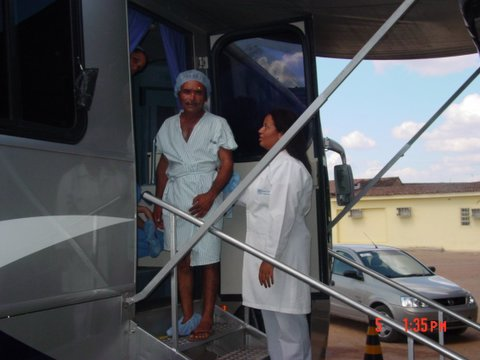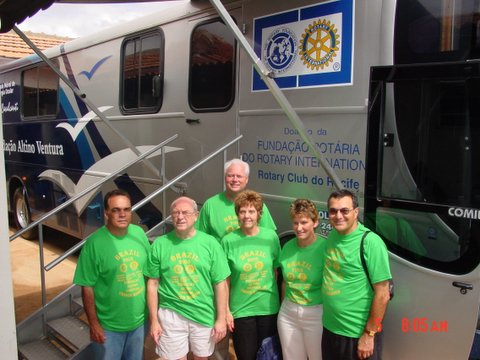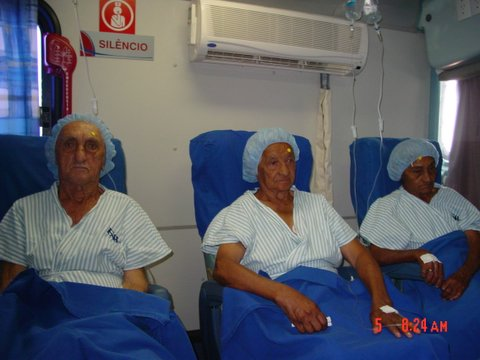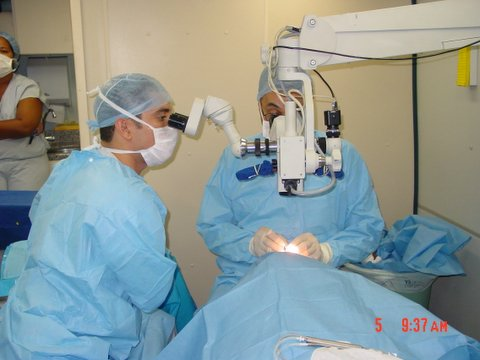
Mobile Surgery Unit Brings Needed Treatment to Remote Areas
In America most people automatically schedule an appointment with the appropriate -- and usually nearby -- doctor when they experience a health problem. Not so, of course, in too many places around the world. Our experiences during the recent mission trip to Brazil, from October 1-9, illustrated to me how much can be accomplished for those who have extremely limited access to care when many people work together toward a common goal. Traveling six hours from the city of Recife, we accompanied the surgical staff of the Altino Ventura Foundation in their wonderful new mobile surgical unit to provide state-of-the-art eye surgery to people in Ouricuri, a remote semi-dessert area where people ordinarily do not receive quality medical care. I was almost overwhelmed when I witnessed the effect the mobile unit has had by restoring the eyesight of people in that area, especially when I consider that, just a little over two years ago, high-quality medical treatment in Salgueiro would not have been possible. 
Buying and converting a large passenger bus into a mobile eye surgery unit was a dream of the Altino Ventura Foundation, comprised of ophthalmologists Drs. Marcelo Ventura, Liana Ventura, and Ronald Cavalcanti, who wanted to bring the best eye treatment available to people living in small villages and remote areas. Established in 1986, the foundation provides free medical care to low income people at its hospital and rehabilitation center in Recife, in recent years treating an average of 1,000 patients a day. But, until recently, the foundation lacked the funding for a mobile unit that could travel to isolated locations.

Then, in 2000, at a Rotary International meeting in California, a group of governors discussed the foundation’s idea and decided to support the project by raising funds from their Rotary districts and individual donors. Among them were governors-elect Jose Ubiracy Silvia from district 4500 in Recife, Karl Drzymala from district 7500 in New Jersey, and president-elect Frank Devlyn, an optician in Latin America and advocate for programs to prevent and correct avoidable blindness. Two years later, the governors had raised $125,000, which Rotary International matched for a total of $250,000, the amount needed for the mobile eye surgery unit. “This was the largest matching grant Rotary International ever gave out,” said Drzymala. 
Preventable and correctable blindness afflicts a large percentage of the population in Brazil, due to a combination of factors, including dietary deficiencies, lack of proper eye protection from the sun, and premature births. In addition, many people either don’t live near a medical facility, are not aware that treatment is available, or can’t afford the care they need. “We’ve noticed an average of 54 percent of disabled children we’ve treated in Recife had never had an eye exam, and 60 percent had not attended school,” explained Dr. Liana Ventura, a pediatric ophthalmologist. “The main problem is socioeconomic.” When he learned of the need for eye surgery among Brazilians, Drzymala was moved to action, heading the effort to raise funds for the mobile surgical unit from his Rotary district. But, he said, it wasn’t until after the unit was built and he visited Recife to attend the dedication ceremony, that he understood the magnitude of that need. “People would walk for weeks to get to the hospital,” he said. “I personally witnessed people in lines three blocks long trying to get to the foundation.”  Modern operating theatre on bus with microscope and phacoemulsifier. Dr. Alley operating, assisted by Brazilian ophthalmologist
During our team’s mission to Brazil, made possible by the Rotary and World Blindness Outreach (WBO), we saw the mobile unit in operation, examined and treated patients, and exchanged information with the foundation’s surgical team. I had the opportunity to perform surgery in the bus, a very modern surgical theater, custom built from a new Volkswagen chassis and equipped by the foundation for cataract surgery, cornea transplants, and glaucoma screening. Boarding the bus was like entering another world. Mission team members who traveled with me in the unit included Cindy Poucel, a surgical nurse from Lancaster, PA; John Hammer, governor-elect for Rotary district 7500 in New Jersey; Michael Peuler, a Rotarian from Ephrata, PA, who served as our non-medical coordinator; and Paula S. Monroe-Lee, a Rotarian, paralegal, and registered nurse from Lumberton, NJ. We saw people lined up outside the bus for surgery, and we witnessed first-hand the deep appreciation people felt for the care now available to them and their loved ones—particularly when, after treatment, they could see again and handle basic daily activities independently. Ventura said that, since the mobile unit began operating two years ago, the foundation has performed over 2,500 eye surgeries, averaging 20 a day, in the converted bus. According to Drzymala, between its work at the hospital and in the unit, the foundation in Brazil has “projected that in the course of five years, they will do over 30,000 surgeries.” Another component of the mission was blindness rehabilitation and training at the foundation hospital in Recife. Kay Macsi and Chris Ament, rehabilitation and education specialists from the Susquehanna Association for the Blind, Lancaster, PA, offered a lecture series to a multidisciplinary team of professionals. And they provided clinical training while treating adults and children in the rehabilitation center. Macsi and Ament also donated special equipment and helped teach people to use it. “We took two suitcases full of white canes, magnifiers, sunshields, and toys,” explained Macsi. By the reaction of those who received the gifts, “it was like we were giving them gold,” she said. “There was an older gentleman who had lost his vision 10 or 11 years ago and had not gone anywhere without his wife during that time, not even to the bathroom,” remembered Macsi. “We decided to see if he could use a white cane. It took him about five minutes to learn to grip it correctly, and once he started walking, it was as if he were flying. His wife was standing there with tears practically running down her face. There was no stopping him—he was just flying down the halls.” For Macsi, and for all of us, it was also evident how much we gained during the trip. We didn’t just take things to them, she said, but we picked up ideas that we can implement at home. For example, “they had art hung up that was beautiful, made by children with vision impairments,” recalled Macsi. “We thought, ‘we can let our children do that, even if they are visually impaired.’” As we witnessed the outcomes of many people’s efforts and generosity—whether the magnificent mobile surgery unit or the restored independence and dignity that treatment makes possible—we were gratified, but also inspired to continue pursuing new ventures. According to Ventura, the foundation hopes to build a specialized facility in Recife, so that the hospital and rehabilitation center, now housed in rented space, can provide better care to its low-income patients. Drzymala said that the Rotarians who’ve traveled with us on eye missions plan to spread the word among Rotary Clubs, to increase awareness of the widespread need addressed by Rotary support. And, though we haven’t formalized plans yet, WBO and Rotary Club members expect to return to Brazil for another eye mission. But in the meantime, WBO is preparing for missions from February through October 2006, to Panama, Ethiopia, Mexico, the Dominican Republic, and Ecuador. And, we’re in the planning stages for a mission to Cambodia, either for the end of 2006 or early 2007.
Dr. Albert A. Alley, a diplomate of the American Board of Ophthalmology, practices in Lebanon, PA, and is a clinical assistant professor of ophthalmology at Penn State University’s College of Medicine at the Hershey Medical Center. He is co-founder and president of World Blindness Outreach, Inc., a humanitarian organization that supports eye missions to treat correctable blindness and preventable eye diseases among indigent peoples throughout the world. You can contact Dr. Alley at World Blindness Outreach, Inc., 1510 Cornwall Road, Lebanon, PA 17042 or at (717) 273-0662. Send email to wbo@nbn.net. Visit the World Blindness Outreach Web site at www.worldblindnessoutreach.com.
|




